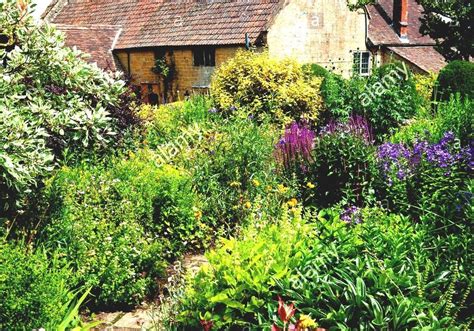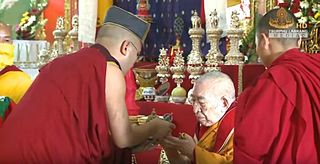A Quote by Aldous Huxley
Of course the Dharma-body of the Buddha was the hedge at the bottom of the garden. At the same time, and no less obviously, it was these flowers, it was anything that I - or rather the blessed Not-I - cared to look at.
Related Quotes
If, I can someday see M. Claude Monet's garden, I feel sure that I shall see something that is not so much a garden of flowers as of colours and tones, less an old-fashioned flower garden than a colour garden, so to speak, one that achieves an effect not entirely nature's, because it was planted so that only the flowers with matching colours will bloom at the same time, harmonized in an infinite stretch of blue or pink.
There is a perennial classical question that asks which part of the motorcycle, which grain of sand in which pile, is the Buddha. Obviously to ask that question is to look in the wrong direction, for the Buddha is everywhere. But just as obviously to ask the question is to look in the right direction, for the Buddha is everwhere.
you mustn't rely on your flowers to make your garden attractive. A good bone structure must come first, with an intelligent use of evergreen plants so that the garden is always clothed, no matter what time of year. Flowers are an added delight, but a good garden is the garden you enjoy looking at even in the depths of winter.
Dharma has several connotations in South Asian religions, but in Buddhism it has two basic, interrelated meanings: dharma as 'teaching' as found in the expression Buddha Dharma, and dharma as 'reality-as-is' (abhigama-dharma). The teaching is a verbal expression of reality-as-is that consists of two aspects-the subject that realizes and the object that is realized. Together they constitute 'reality-as-is;' if either aspect is lacking, it is not reality-as-is. This sense of dharma or reality-as-is is also called suchness (tathata) or thatness (tattva) in Buddhism.
The buddha-dharma does not invite us to dabble in abstract notions. Rather, the task it presents us with is to attend to what we actually experience, right in this moment. You don't have to look "over there." You don't have to figure anything out. You don't have to acquire anything. And you don't have to run off to Tibet, or Japan, or anywhere else. You wake up right here. In fact, you can only wake up right here. So you don't have to do the long search, the frantic chase, the painful quest. You're already right where you need to be.
There are several realms which ordinary persons do not perceive. Because they cannot see them, that doesn't mean they don't exist. One of these realms is the sambhogakaya that can only be visited by highly realized Bodhisattvas. In the pure realm of the sambhogakaya, the Dharma is continuously taught. One sambhogakaya realm is Tushita, which is presided over by the next Buddha, the Maitreya Buddha. Buddha Shakyamuni dwelled there before coming to earth to give Dharma teachings.
In Buddhism, there are three gems: Buddha, the awakened one; Dharma,
the way of understanding and loving; and Sangha, the community that
lives in harmony and awareness. The three are interrelated, and at
times it is hard to distinguish one from another. In everyone there
is the capacity to wake up, to understand, and to love. So in
ourselves we find Buddha, and we also find Dharma and Sangha.
In the autumn I gathered all my sorrows and buried them in my garden. And when April returned and spring came to wed the earth, there grew in my garden beautiful flowers unlike all other flowers. And my neighbors came to behold them, and they all said to me, "When autumn comes again, at seeding time, will you not give us of the seeds of these flowers that we may have them in our gardens?"
God made a beauteous garden With lovely flowers strown, But one straight, narrow pathway That was not overgrown. And to this beauteous garden He brought mankind to live, And said "To you, my children, These lovely flowers I give. Prune ye my vines and fig trees, With care my flowers tend, But keep the pathway open Your home is at the end." God's Garden
That could be applied to whatever you feel. Maybe anger is your thing. You just go out of control and you see red, and the next thing you know you're yelling or throwing something or hitting someone. At that time, begin to accept the fact that that's "enraged buddha." If you feel jealous, that's "jealous buddha." If you have indigestion, that's "buddha with heartburn." If you're happy, "happy buddha"; if bored, "bored buddha." In other words, anything that you can experience or think is worthy of compassion; anything you could think or feel is worthy of appreciation.






































